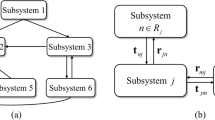Abstract
Decision-making under uncertainty is particularly challenging in the case of multidisciplinary, multilevel system optimization problems. Subsystem interactions cause strong couplings, which may be amplified by uncertainty. Thus, effective coordination strategies can be particularly beneficial. Analytical target cascading (ATC) is a deterministic optimization method for multilevel hierarchical system design that has been extended to probabilistic formulations. Solving the probabilistic optimization problem requires propagation of uncertainty, namely, evaluating or estimating the output distributions, a task that is computationally expensive for highly nonlinear functions. This article presents the use of sequential linear programming (SLP) for probabilistic ATC. By linearizing and solving a problem successively, the strategy takes advantage of the simplicity and ease of uncertainty propagation for a linear system under the assumption that inputs are normally distributed or can be transformed into equivalent normal distributions. A suspension strategy, developed for a deterministic SLP coordination strategy for ATC, is applied to reduce computational cost by suspending the analyses of subsystems that do not need considerable redesign. The accuracy and effectiveness of the proposed coordination strategy is demonstrated with several numerical examples.







Similar content being viewed by others
References
Allison J, Kokkolaras M, Zawislak M, Papalambros P (2005) On the use of analytical target cascading and collaborative optimization for complex system design. In: The 6th world congress on structural and multidisciplinary optimization, Rio de Janeiro, 30 May–3 June 2005
Alyaqout SF, Papalambros PY, Ulsoy AG (2005) Quantification and use of system coupling in decomposed design optimization problems. In: ASME international mechanical engineering congress and exposition (IMECE2005-81364), Orlando
Batill SM, Renaud JE, Gu X (2000) Modeling and simulation uncertainty in multidisciplinary design optimization. In: 8th AIAA/USAF/NASA/ISSMO symposium on multidisciplinary analysis and optimization (AIAA-2000-4803), Long Beach
Breitung K (1989) Asymptotic approximations for probability integrals. Probab Eng Mech 4(4):187–190
Chan K-Y, Skerlos S, Papalambros PY (2006) Monotonicity and active set strategies in probabilistic design optimization. ASME J Mech Des 128(4):893–900
Chan K-Y, Skerlos SJ, Papalambros P (2007) An adaptive sequential linear programming algorithm for optimal design problems with probabilistic constraints. ASME J Mech Des 129(2):140–149
Cornell C (1967) Bounds on reliability of structural systems. J Struct Div (ASCE) 93(ST1):171–200
Du X, Chen W (2002) Efficient uncertainty analysis methods for multidisciplinary robust design. AIAA J 40(3):545–552
Du X, Chen W (2005) Collaborative reliability analysis under the framework of multidisciplinary systems design. Opt Eng 6(1):63–84
English K, Bloebaum C, Miller E (2001) Development of multiple cycle coupling suspension in the optimization of complex systems. Struct Multidisc Optim 22(4):268–283
Fletcher R, Leyffer S, Toint P (1998) On the global convergence of an SLP-filter algorithm. Numerical analysis report NA/183, vol 98(13). University of Dundee, UK, pp 1–11
Fletcher R, Leyffer S, Toint, PL (2006) A brief history of filter methods. Tech Rep ANL/MCS-P1372-0906, Argonne National Laboratory, Mathematics and Computer Science Division
Han J, Papalambros PY (2010a) A sequential linear programming coordination algorithm for analytical target cascading. ASME J Mech Des (in press)
Han J, Papalambros P (2010b) Optimal design of hybrid electric fuel cell vehicles under uncertainty and enterprise considerations. J Fuel Cell Sci Technol (in press)
Hock W, Schittkowski K (1981) Test examples for nonlinear programming codes. Springer, New York
Hohenbichler M, Rackwitz R (1983) First-order concepts in system reliability. Struct Saf 1(3):177–188
Kasarekar NT, English KW (2004) Development of a hybrid MDF/IDF multidisciplinary optimization solution method with coupling suspension. In: 10th AIAA/ISSMO multidisciplinary analysis and optimization conference, Albany, 30 August–1 September, pp 1865–1874
Kim HM, Michelena N, Papalambros P, Jiang T (2003) Target cascading in optimal system design. ASME J Mech Des 125(3):474–480
Kokkolaras M, Mourelatos ZP, Papalambros PY (2006) Design optimization of hierarchically decomposed multilevel systems under uncertainty. ASME J Mech Des 128(2):503–508
Liu H, Chen W, Kokkolaras M, Papalambros P, Kim H (2006) Probabilistic analytical target cascading: a moment matching formulation for multilevel optimization under uncertainty. ASME J Mech Des 128(4):991–1000
Mangasarian OL (1969) Nonlinear programming. McGraw-Hill, New York
Michelena N, Park H, Papalambros PY (2003) Convergence properties of analytical target cascading. AIAA J 41(5):897–905
Mitteau J-C (1996) Error estimates for FORM and SORM computations of failure probability. In: Probabilistic mechanics and structural and geotechnical reliability, pp 562–565
Papalambros P, Wilde D (2000) Principles of optimal design: modeling and computation, 2nd edn. Cambridge University Press, Cambridge
Tosserams S, Etman L, Papalambros P, Rooda J (2006) An augmented lagrangian relaxation for analytical target cascading using the alternating direction method of multipliers. Struct Multidisc Optim 31(3):176–189
Wu Y, Millwater H, Cruse T (1990) Advanced probabilistic structural analysis method for implicit performance functions. AIAA J 28(9):1663–1669
Youn BD, Choi KK (2004) A new response surface methodology for reliability-based design optimization. Comput Struct 82(2–3):241–256
Acknowledgements
This work was partially supported by the US National Science Foundation (Grant DMI-0503737), by General Motors Corporation, and by the Automotive Research Center, a US Army Center of Excellence in Modeling and Simulation of Ground Vehicle Systems at the University of Michigan. This support is gratefully acknowledged. We would like to thank Dr. Michael Kokkolaras for his advise and comments.
Author information
Authors and Affiliations
Corresponding author
Additional information
Presented in the 7th World Congress on Structural and Multidisciplinary Optimization, COEX Seoul, Korea, May 21–25, 2007.
Rights and permissions
About this article
Cite this article
Han, J., Papalambros, P.Y. An SLP filter algorithm for probabilistic analytical target cascading. Struct Multidisc Optim 41, 935–945 (2010). https://doi.org/10.1007/s00158-009-0450-9
Received:
Revised:
Accepted:
Published:
Issue Date:
DOI: https://doi.org/10.1007/s00158-009-0450-9




